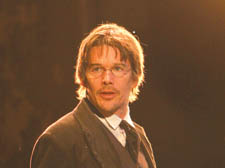|
|
 |
| |

Ethan Hawke in the Cherry Orchard |
Mendes bridges Atlantic with a project oozing class
THE CHERRY ORCHARD
and THE WINTER'S TALE
Old Vic
HIGH culture is a heavy load to bear.
Sam Mendes’s trans-Atlantic Bridge Project appoints itself ambassador to such lofty arts by dint of an interstellar cast and an ambitious double-bill of “difficult” classics – Chekhov’s The Cherry Orchard and Shakespeare’s The Winter’s Tale – but nagging doubts persist. Can the company shoulder the huge expectations of this venture or is it a bridge too far? And does either play gain from the other’s propinquity: Is Chekhov better off for having Shakespeare’s foot in his mouth?
The jury is still out on the second question.
Both works walk a fine line between hope and despair, though The Cherry Orchard’s story of crumbling oligarchs in late 19th-century Russia vacillates between the two extremes far less than its companion piece, a play of unnatural tragedy and surreal redemption.
In the Chekhov, each character hides behind the mask of their social status; in the Shakespeare, people disguise or lose their identities, or are accused of being something they are not.
On this occasion, however, compare and contrast exercises are moot. Quibbles over the cast’s cocktail of American and English accents – so often a happy pastime for armchair critics everywhere – feel similarly vapid. Because whichever way you cut it, The Bridge Project oozes class.
Mendes, the director of American Beauty, is no stranger to the stage. He made his name with a series of acclaimed productions at the Donmar Warehouse. Simon Russell Beale, the lynchpin of several of those earlier successes, repeats the favour here with two towering performances: as the nouveau rich merchant Lopakhin in The Cherry Orchard and the violently cynical king, Leontes, in The Winter’s Tale.
Beale has a command over language few actors possess. His ability to breathe life into Chekhov or to make the Bard’s gilded verse sound contemporary – to take the obscurantism out of theatre – is far more impressive than it sounds.
As Lopakhin, he spends the first half trying to get a word in edgeways in the company of the dreamy, insouciant aristocrats, Ranevskaya (Sinead Cusack) and her dithering brother, Gaev (Paul Jesson).
Their fortune is squandered and the estate is up for auction but neither sibling seems willing, or able, to face the situation. Tom Stoppard’s new version plays up the laughs (which is always welcome in Chekhov), particularly for the excellent Jesson and Dakin Matthews as his money-grubbing neighbour.
Cusack, fantastic as Paulina in The Winter’s Tale, is perhaps too skittish a Ranevskaya to convince when she grows brittle in the superbly staged party scene.
Nevertheless, the image of her proud figure crumpled in despair is an enduring one.
At the final curtain a sliver of hope remains for the dispossessed family; but the predominant feeling is a great and profound emptiness.
The Winter’s Tale travels conversely, galumphing from morose to merry.
Leontes (Beale) believes his queen, Hermione (Rebecca Hall), to be unfaithful, “a ponged fish”.
His jealousy tears his family asunder: death strikes, his newborn daughter is abandoned.
From the dark Satanic mills of Sicilia, where the English actors reside, the action moves to Bohemia, home of the American thespians, where Ethan Hawke, leery with silver teeth, quite literally steals the show as the thief Autolycus.
Some of the casting and the ridiculous country dance are ill-judged, but the production’s statuesque denouement does itself and this whole starry endeavour justice in the end.
Until August 15
|

|
 |
|
|
 |
|



